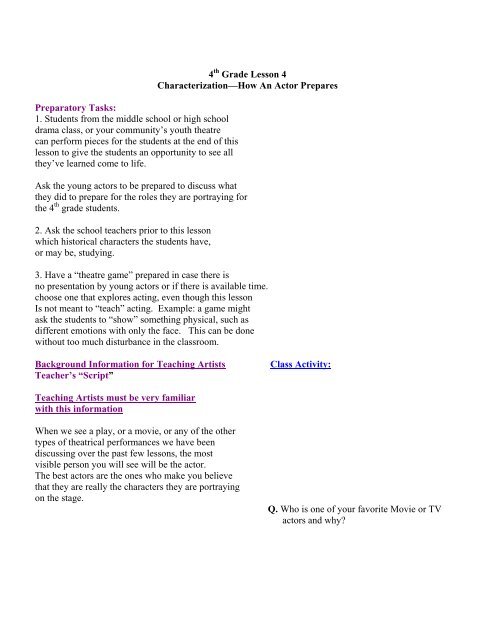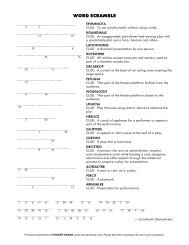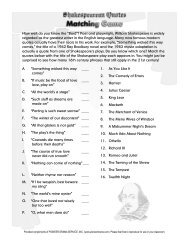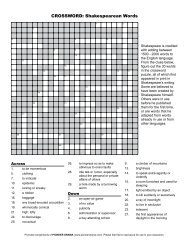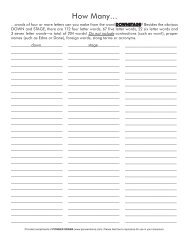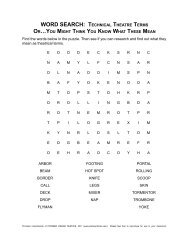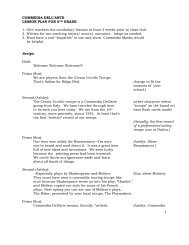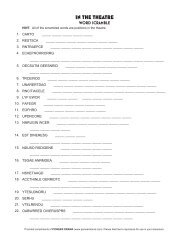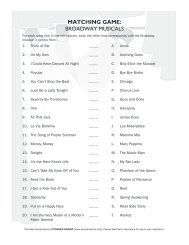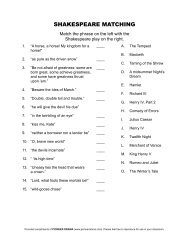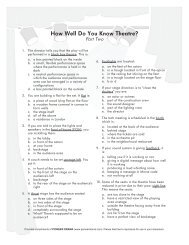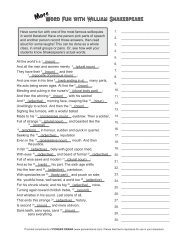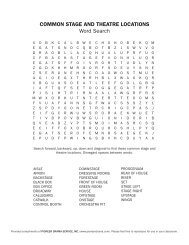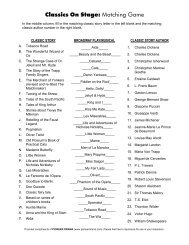4 Grade Lesson 4 CharacterizationâHow An Actor Prepares ...
4 Grade Lesson 4 CharacterizationâHow An Actor Prepares ...
4 Grade Lesson 4 CharacterizationâHow An Actor Prepares ...
Create successful ePaper yourself
Turn your PDF publications into a flip-book with our unique Google optimized e-Paper software.
Preparatory Tasks:<br />
1. Students from the middle school or high school<br />
drama class, or your community’s youth theatre<br />
can perform pieces for the students at the end of this<br />
lesson to give the students an opportunity to see all<br />
they’ve learned come to life.<br />
4 th <strong>Grade</strong> <strong>Lesson</strong> 4<br />
Characterization—How <strong>An</strong> <strong>Actor</strong> <strong>Prepares</strong><br />
Ask the young actors to be prepared to discuss what<br />
they did to prepare for the roles they are portraying for<br />
the 4 th grade students.<br />
2. Ask the school teachers prior to this lesson<br />
which historical characters the students have,<br />
or may be, studying.<br />
3. Have a “theatre game” prepared in case there is<br />
no presentation by young actors or if there is available time.<br />
choose one that explores acting, even though this lesson<br />
Is not meant to “teach” acting. Example: a game might<br />
ask the students to “show” something physical, such as<br />
different emotions with only the face. This can be done<br />
without too much disturbance in the classroom.<br />
Background Information for Teaching Artists<br />
Teacher’s “Script”<br />
Class Activity:<br />
Teaching Artists must be very familiar<br />
with this information<br />
When we see a play, or a movie, or any of the other<br />
types of theatrical performances we have been<br />
discussing over the past few lessons, the most<br />
visible person you will see will be the actor.<br />
The best actors are the ones who make you believe<br />
that they are really the characters they are portraying<br />
on the stage.<br />
Q. Who is one of your favorite Movie or TV<br />
actors and why?
Background Information for Teaching Artists<br />
Teacher’s “Script<br />
A great deal of work goes into being an actor<br />
<strong>Actor</strong>s must prepare themselves for each role they<br />
play. There are many skills that an actor needs to<br />
be successful in his or her portrayal of a character.<br />
Imagination<br />
Research -<br />
Reading<br />
Interviews<br />
Observation<br />
Study the script for clues –<br />
be respectful of the playwright<br />
Focus of attention<br />
Vocal training –<br />
power, expressiveness, clarity, singing<br />
Physical training – general fitness, flexibility,<br />
mime, acrobatics, fight training, dance<br />
Insight into the psychology of human behavior<br />
Ability to not be self-conscious –<br />
be a fool, or be vulnerable, or be<br />
unpleasant<br />
Posture – energy - expression<br />
<strong>An</strong> understanding of how make-up and<br />
costuming can be useful<br />
Has the class been studying an historical person?<br />
Check with the school teacher prior to this class<br />
lesson. (See above)<br />
Class Activity:<br />
Introduction<br />
Q. What are some of these?<br />
‣Write skills on the board as students share<br />
ideas. Some of the skills or qualities that we<br />
want to encourage the students to name are<br />
listed to the side. You may have to help a lot<br />
with suggestions.<br />
Historical Characterization<br />
Q. If you were an actor who is going to portray<br />
an historical person who is the person you<br />
would chose?<br />
Q. How would you use the skills we just named<br />
and that are listed on the board to help you<br />
understand this person and make your<br />
portrayal of the person believable to an<br />
audience?
Background Information for Teaching Artists<br />
Teacher’s “Script”<br />
Class Activity:<br />
‣<br />
Do Your Research:<br />
There are lots of things to examine as you<br />
try to understand this person. Let’s<br />
consider some of the details that you<br />
would need to know in order to be able to<br />
accurately portray this character?<br />
Questions:<br />
o Characters can be from different times<br />
than those we live in today and their daily<br />
lives may be very different from yours.<br />
How were those time different from<br />
today?<br />
o Some may have had extreme physical<br />
characteristics. Did the person you chose<br />
have a handicap, a particular appearance,<br />
etc? What would the character’s posture<br />
be?<br />
o What about the voice of the person? Was<br />
it strong and loud, or soft? Did the<br />
person have an accent or regional dialect?<br />
o Do you know something about the<br />
person’s personality that would help?<br />
Fictional Characterization<br />
Q. How would playing a character that only<br />
exists on a page—a “fictional” character-- be<br />
different from playing a person who has actually<br />
lived?<br />
‣<br />
Use Your Imagination<br />
Consider these questions:<br />
o Who am I<br />
o What is happening in this story<br />
o What are my relationships with others<br />
o What do I want<br />
o What is my obstacle or challenge<br />
o What do I do to get what I want<br />
o Where have I been<br />
o Where am I now
Background Information for Teaching Artists<br />
Teacher’s “Script”<br />
Class Activity<br />
o Why am I here<br />
o Where am I going<br />
o What am I wearing<br />
Q. How would you decide how a character that<br />
only exists on a page would behave and think?<br />
‣<br />
Study the script for clues<br />
Delivering the Character<br />
Now that you know who your character is your<br />
job as an actor is to get your audience to know<br />
and believe the character.<br />
“I am taking a trip to Chicago this week to see my<br />
family,” is an example of a line that could be spoken<br />
by all three characters “I’ve lost my book,” is another.<br />
The guideline is to choose statements that is<br />
appropriate to all three ages. Driving a car, going to<br />
work are examples that would not be suitable.<br />
Discuss with the students the resources available in<br />
their homes, schools, and communities to help them<br />
prepare to be actors.<br />
o Choose 3 students (who have proven<br />
creativity and ability in previous classes).<br />
o Have them portray a little child, an old<br />
man and a high school senior.<br />
o Have them deliver the same line, but in<br />
their character.<br />
o Remind them to use posture, dialect and<br />
voice qualities to enhance their character.<br />
They are free to ad lib and fill in the<br />
details.<br />
These resources include:<br />
Q. If you were to consider becoming an actor,<br />
Attend as many plays as possible what can you do right now, in your town<br />
Attend drama or theatre classes in your school to develop the skills that are necessary to<br />
or in your community<br />
becoming a good and believable actor?<br />
Read biographies of actors to see how they<br />
prepared<br />
Read as many plays as possible<br />
Become involved in your local community theatres<br />
Work backstage to observe actors at work<br />
Read “how-to” books on acting, auditioning, etc.<br />
Become “people watchers”
Background Information for Teaching Artists<br />
Teacher’s “Script”<br />
Class Activity<br />
Presentation by drama students<br />
(See above)<br />
This can serve as a review of the information<br />
taught in this lesson.


